- Home
- Anthony Burgess
Napoleon Symphony
Napoleon Symphony Read online
NAPOLEON SYMPHONY
ANTHONY BURGESS
A complete catalogue record for this book can
be obtained from the British Library on request
The right of Anthony burgess to be identified as the author of this work has been asserted
in accordance with the Copyright, Designs and Patents Act 1988
Copyright © 1974 Anthony burgess
All rights reserved. No part of this book may be reproduced, stored in a retrieval system or
transmitted in any form or by any means, electronic, mechanical, photocopying, recording
or otherwise, without the prior permission of the publisher.
First published in 1974 in the USA by Alfred A Knopf, Inc, New York
First published in this edition in 2012 by Serpent’s Tail,
an imprint of Profile Books Ltd
3A Exmouth House
Pine Street
London ECIR OJH
website: www.serpentstail.com
ISBN 978 1 84668 916 1
eISBN 978 1 84765 891 3
Typeset in Jenson by MacGuru Ltd
[email protected]
Printed and bound in Great Britain
by Clays, Bungay, Suffolk
1 3 5 7 9 10 8 6 4 2
The paper this book is printed on is certified by the © 1996 Forest Stewardship
Council A.C. (FSC). It is ancient-forest friendly. The printer holds FSC chain
of custody SGS-COC-2061
To my dear wife, a Buonapartista, who, in her
extreme youth, could never understand why the
British had named a great railway terminus after
a military defeat.
Also to Stanley J. Kubrick,
maestro di color…
Tallien pressed his old royal watch and it chimed a new republican nine. “An hour late already.” Ventôse siffled in from the rue d’Antin and flapped the candle flames. There was a faint odor of scorched varnish from the wooden leg of the acting registrar asleep by the fire. Calmelet the lawyer, hers, in no hurry, said:
“The hours could have been longer. Or more of them to wait through. It was proposed, was it not, to decimalize the day as well as the week. Ten very long hours or a hundred very short ones. I will meet you, citizeness, at 93.55,” chuckling. “The long ones could have been given names by poor d’Eglantine. Or was it Romme? No, Romme was no poet. They’re both dead, anyway.”
“There have been some fantastic ideas presented to the Directory,” Barras said. “Someone wrote somewhere that revolutions are best left to the conservative.”
“That was somebody else who died,” Tallien said. “And somebody else said that the Goddess of Reason is proud of her ten fingers.”
“The man who said that is still alive,” Barras said, “and intends to remain so.”
“Witty,” Calmelet giggled. “Dinaire. Dormial. Amorose. How about those, eh? For the hours. The hour of Amorose was striking.”
Barras tickled four fingers with the trinity of plumes on his directorial hat. A man in love with the senses, Tallien thought yet again. He would sell anything for the senses. To be watched. “Total consistency,” Barras said, “is to be avoided as inhuman.”
“You mean Jacobin,” Tallien said.
“Let five and three dance together in amity. There is a sort of classical poem in which twelve syllables alternate with ten.”
“Elegiac, I think,” Calmelet said. The registrar, acting, snorted in his sleep. “It is not appropriate to speak of elegies. Epithalamia, perhaps. A pity that the names of the months are so, shall we say, local? Foggy, Snowy, Rainy, Windy. In Madame’s country these names do not apply.”
“There are rain and wind and mist.” But they sounded as languorous as her vowels.
“Yes yes, what I mean is that as terms of mensual designation—”
“It’s right that our tropical French should be reminded of the weather in Paris,” Barras said.
“But in Madame’s country it will always be Thermidor.”
“It seems a long time ago,” Tallien said. “Thermidor.”
“Yes yes yes, you braved it, you were very brave.” Barras stroked the tip of his nose with the tip of a plume. He hovered voluptuously on the promise of a sneeze but, a strong man, would not yield. Sniffing, he looked at Madame, petulant in her chair. He knew the body under the muslin dress, or rather he had a memory of its knowledge. You could know a book but you could only remember knowing a body. It was not the body that changed so much as the fingers that touched it. And it would not be long before he could think the same about the gorgeous, as it was now, body of Tallien’s wife. The electric charge failed, something like that. Science. The Revolution has no need of scientists. Nonsense really. She said:
“I might as well go home.”
“You and he will go home together,” Barras said. “Courage, patience. He has much to do.”
“There were longer waits,” Tallien said. “No waits should be hard for us any more.” She looked at him, posing on his chair as for a painter. Past glory caught in a cadence. Oh, make an alexandrine of it. Tallien on the stage, tumbrils rumbling in the wings. Shed then the tyrant’s blood that blood be shed no more. And, from the window of the Carmes prison, she had seen that old woman dancing in toothless joy, a pierre in one hand, the dirty end of her robe in the other.
“Courage, patience, amity,” Calmelet smiled, admiring her elegant neck, “for your new republic in which the month shall ever be Floréal.” She was tricolored in flowers, she loved flowers. There had been a time when necks like hers had been ribboned in red for what they called survivors’ dances, usually ending in hysterics. Suddenly the acting registrar called a name from his sleep.
“It sounded like Joseph,’ Tallien said. “One of your names. The name he has feminized and diminutized for you.”
“The name perhaps of an old comrade-in-arms,” Calmelet said. “That is very interesting, what a man will call in his sleep. Or perhaps a son or a brother. It is of course also,” he said, “the name of your new brother-in-law. Titular head.”
“I do not have him as a brother-in-law yet. I begin to wonder if I ever will.”
“If he calls the name Catherine,” Barras said, “then we shall know that his sleeping mind is troubled about an imposture. Very ironic. There have to be certificates of birth. Those are lodged in their respective islands. Both islands are in the hands of the British enemy. Very ironic.”
“Not forever,” Calmelet said.
“So he must use his brother’s and she her sister’s. A harmless enough imposture.”
And, she thought, elder brother and younger sister, it brings our ages closer together, is he thinking that? We are made to be but a year apart. She felt her age as she felt Ventôse nip in again through the window crack that had been healed with some old ill-printed proclamation beginning Citizens. I have passed through too many hands. “If we must go on waiting, what shall we do? If I’d brought my tarot I could be telling all our fortunes. That passed the time once.”
“We know our fortunes,” Tallien acted. “We survived, and that’s enough. Now there’s a bigger—”
“Yes yes,” Barras said. “That is what all the waiting is about.”
“Joseph,” Calmelet said, “had a coat of many colors and saved Egypt. He would not be seduced by his employer’s wife. In France he’s always been derided for that. And of course there’s the other one, the holy cuckold.” Nobody smiled. Barras said:
“We’ve abandoned religion but not, I hope, good taste.”
“Oh, very aristo,” Tallien said. Barras looked at him. Survival.
“I stand rebuked, Citizen Director,” Calmelet said, though with no tone of abashment. “M
yths, nevertheless, that have misled a whole country and kept them in slavery.”
“These slogans ring hollow in a small room,” Barras said, “when people are waiting for a wedding. True, yes, but they ring hollow. We must start thinking of new modes of taste and propriety. We are the custodians of civilization.”
“Survival first,” Tallien said.
“It’s civilization in the bigger sense that has to survive.” He kept to himself, as tasteless, the image of wagons rolling north, full of meltable plate from whipped monarchies. The registrar abruptly changed his position but went on sleeping. He uttered irritable sounds, but they were not words.
“That wooden leg is almost in the fire,” Calmelet said. “Would there be, perhaps, a sort of memory of feeling as it were associated with the missing extremity? Ah yes, see, he’s moved it away.” The registrar shifted grumbling and seemed about to wake. “Sleep on,” Calmelet soothed. “The bridegroom himself will awaken you.” He looked cunningly around to see if any had caught the biblical echo, but there was the sound of two pairs of feet outside, approaching. They all cocked to it, but the sound passed on. Barras began to feel that, after all, apart from that special courtesy due to the bride, the general courtesy due to representatives of the state and the law, there was something deeper and, as it were, reverent due to himself as, so to speak, patron as well as powerful finger of the hand of authority, the ruling—
“What do you call a group of five, Calmelet?”
“A quincunx? No, a quinquevirate.”
Monsieur Goodpart could have sent a message from his headquarters. There was a disquieting whiff of insubordination here, as of a man too insolently aware of the authority of cannonballs. And then (but this had to be quickly dismissed) the head-swimming doubt whether he would come at all, having taken fright like other bridegrooms before him. No, the man palpitated with adolescent love, he practically spasmed into his breeches on very sight of her. The electricity was in him to excess. And did not the way to the Alps lie (this was coarse, he admitted) between her legs? Take it another way and be calm: they were all three of them aristocrats, though those two from disregardable island colonies, speaking very provincial French, language with no kiss in the vowels. They all three had, in a sense, to cling together in a world ruled by the middle-class. A cast-off mistress settled in a reasonable marriage, a friendly man who took deep breaths and had a brain clever with cannonballs. The two were, so to speak, engines of his own survival.
Calmelet, trying to amuse the pouting bride, was fantasying about the acting registrar’s wooden leg. “Neither a royal nor a revolutionary tree but a tree of France—simply that. Giving up a fragment of its being as he, this sleeping one here, gave up a fragment of his. In what war? For what cause? Like trees, such beings are insentient or indifferent.”
“Write an elegy on it,” Barras half-sneered. “Ode to a patriot’s wooden leg. From that same tree came wood pulp for a new edition of Rousseau. Come on, Calmelet. Amuse us.”
“Well, then,” chortling:
“This son of France, shoeless, without a shirt,
Played in the royal highway’s royal dirt.
Monseigneur’s carriage rolled right over him.
He gained a louis when he lost a limb.
How about that then, eh?” Barras improvised:
“That tree provided a gavel or two
For when the Declaration of Rights went through.
Its bang healed many an intellectual schism
At the confirmation of the Abolition of Feudalism.”
“Oh no,” Calmelet said, “with respect, that is inadmissible prosodic license. Too revolutionary.” Tallien tried:
“Truncheons for the Paris bread riot.
Sawdust for the bread to keep them quiet.”
Calmelet cut in with:
“It might have been a tree made confiscate
Along with Crown or Church land where it sate.
It yielded a strong cane for Mirabeau,
And gave him paper, half a ton or so,
For him to pen his constitutions on.”
Tallien quickly rhymed:
“Perhaps he lost that leg there at Verdun.”
“Well,” Calmelet now prosed. “They’ll never be back on French soil. Madame’s belated bridegroom will see to that.”
Tallien pressed his old royal watch and it chimed a new republican ten. “Yes,” he said. “The kinsmen of that bitch with a crown but no head.”
“We fervently hope,” Barras said. “We fervently pray, if we’re so minded.”
“To the Supreme Being,” Calmelet said piously.
“Well,” Tallien said, “the cult of the Supreme Being served its turn. It held the Convention together, among other less spiritual innovations. It led to Thermidor and the end of—”
“The incarnation of the General Will,” Barras said. “A book can be a stick in the hand of a liberator. The same book can be a tyrant’s weapon. Who can say that the truth lies here or there? The Girondins were inspired by the finest Jean-Jacques motives. They declared war on everybody and they killed a king.”
“They paid for it,” Calmelet said, nodding.
“We go on paying for it. Survival is something that lies in the future. Sieves said that to me. He wants his epitaph to be: He survived”
“Oh, this is absurd,” she said. “How much longer—?”
“Ah.” Calmelet’s quick ears heard first. Feet approached in urgent marching. The door was thrust open. Lemarois, aide-de-camp, the fourth witness. And then. “Lui” Calmelet said.
He strode in. “Wake up. Get your leg out of the fire.” He gave her two excruciating love-pinches, one on each lobe, and cried:
“Begin!”
I
Germinal in the Year Four, but in this opening of our own Year One the seed throbs and frets in frustration. Ah, how I should love to believe that what you have already of mine is at work deep within you. Albenga is on the coast halfway between Nice or Nizza and Genoa or Genova, and I am busy with maps and protractor and chief of staff. Looking up that volume on Piedmont and its topography, I swear I caught the scent of your body from it. It is strange and magical that about those dull tomes with which I encumbered our so short honeymoon your glow and odor should hover. Oh, how I slaver at the thought of you, hunger to chew your very toes, to munch your delta of silk in the valley of bliss—now but a delirious memory and a long promise. Oh, to fill you again with myself as I am filled now to overflowing with your sweetness. The bees, I swear, will buzz around me when we reach the honeylands. It is cold here and the troops grumble still. Kiss after kiss after kiss begins to abrade the crystal of your portrait.
Massena took it from Augereau who had taken it from La Harpe and handed it back. “As I said last time, very handsome.”
“Handsome? Handsome? Life, ecstasy, the goddess of spring, the inspiration of battles. Come along then, Berthier.” Berthier spluttered over his bread and followed him as he strode out into the morning, kissing before stowing.
“This bread tastes of very stale chestnuts,” Augereau said. “Look at him after his night of wet dreams, ready to come in his breeches. Barras’s stale chestnut, that’s what she was, you know that. That’s good, you see that? Chestnut hair, a bit dyed I should think now. Getting on in years, glad to marry that fucking scarecrow out there.”
“We’re all fucking scarecrows,” Massena said.
“It tastes of very stale chestnuts,” Kilmaine said, “because it contains very stale chestnuts.”
“I saw a rotten potato yesterday,” La Harpe said.
“You know what it is I’m going to tell you?” Kilmaine said. “We have horses there, real ones. Talking about chestnuts, I could cry when I think of—”
“That’s the humanity coming out,” Massena said. “You want to watch that Rousseau stuff. They’re things, that’s all, that have got to be used. You can fatten those that survive when we get down there in the plains. Good rich country. Irish.”
<
br /> Outside, in the raw morning, they saw Saliceti riding a fat nutmeg. “It’s a funny thing,” Augereau said. “About the Revolution, that is. You see that one there, with his feathers a mile high and those boots cost plenty, I can tell you. Well, that’s the spirit of the Revolution, supposed to be. There’s the old gap coming back, as in the old days. The men in rags and straw wrapped round their toes, and there you have gold and silver and perfume stinking to heaven.”
“It would be crying stinking fish to go to Genoa looking otherwise,” Massena said. “He went to raise this loan, you see. For the army.”
“He didn’t get it,” La Harpe said.
“He got boots.”
“And that fucking chestnut stuff.”
“Look at it another way,” Augereau said. “You and me, we got out of the ranks by election. The democratic way. Right, lads, vote for old Sergeant-major Massena and make him a colonel. Right?”
“I don’t quite see what you —”
“There’s a limit to democracy. We’re not running this campaign. It’s Wet Dream doing that. Who elected him? Fat womanizing Barras in Paris. Influence again. Intrigue, womanizing. It’s no accident, I tell you—his chestnut mare in one hand and his roll of maps in the other. He got his kissing mixed up the other day. Smacked his big fat Corse smackers on a map of the Po Valley.”
“He did all right at Toulon,” Massena said. “That new man Murat will tell you all about the Tuileries business. Saved the Directory, not that it’s worth saving, guzzling bastards. Cannon, he got this lot of cannon in. It was Murat brought them, on the double. You’d have had worse than the Directory. King’s men howling round the Tuileries. He saw them off, bang bang bang.”
“King’s men howling in the Alps. Austrian bastards.”
“A lot of them. He’ll have his work cut out.”
“Well, we’ll see. In the old days we weren’t encouraged to ask questions. But now I’d like to know what all this is about. Wet Dream says we’re going to take them fraternity and equality—a right fucking recommendation we are, all rags and tatters. You can see how that Saliceti looks at it—gold and silver and loot for those Paris bastards. What’s it all about? If a man believes in the Revolution is he just a fucking idiot?”

 A Dead Man in Deptford
A Dead Man in Deptford Honey for the Bears
Honey for the Bears 1985
1985 A Clockwork Orange
A Clockwork Orange The Doctor Is Sick
The Doctor Is Sick Earthly Powers
Earthly Powers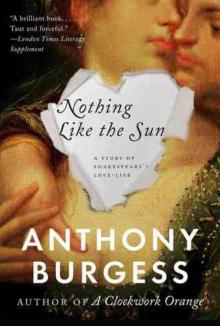 Nothing Like the Sun
Nothing Like the Sun Collected Poems
Collected Poems The Kingdom of the Wicked
The Kingdom of the Wicked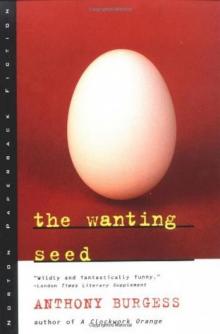 The Wanting Seed
The Wanting Seed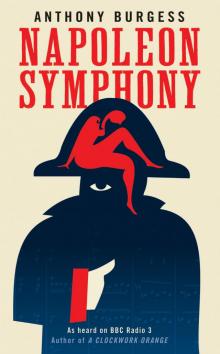 Napoleon Symphony
Napoleon Symphony The Malayan Trilogy
The Malayan Trilogy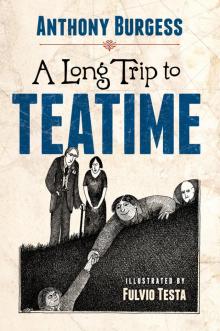 A Long Trip to Teatime
A Long Trip to Teatime Enderby Outside
Enderby Outside M/F
M/F The Complete Enderby
The Complete Enderby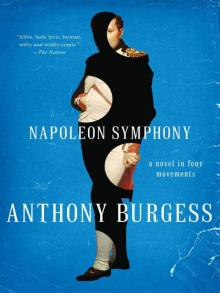 Napoleon Symphony: A Novel in Four Movements
Napoleon Symphony: A Novel in Four Movements Enderby's Dark Lady
Enderby's Dark Lady The Clockwork Testament (Or: Enderby 's End)
The Clockwork Testament (Or: Enderby 's End) ABBA ABBA
ABBA ABBA A Clockwork Orange (UK Version)
A Clockwork Orange (UK Version)